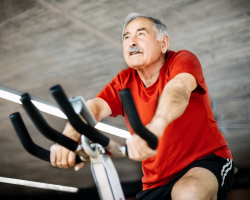
The good news about hip pain? If you're living with it, treatment can help you feel better. And treatment doesn't always mean surgery.
For hip problems such as joint pain caused by arthritis, doctors usually start by suggesting nonsurgical treatments to relieve pain and help you keep moving. And you might have heard of therapies that you'd like to try alongside the treatments your doctor recommends.
6 strategies for coping with hip pain without surgery
Before you have surgery, ask your doctor about these options.
1. Medicines. Over-the-counter non-steroidal anti-inflammatory drugs (NSAIDs) like aspirin, ibuprofen or naproxen may help control hip pain. Prescription-strength NSAIDs also are available. These pain relievers can have side effects. So talk to your doctor about the benefits and risks of using NSAIDs.
2. Joint injections. Injecting corticosteroid medicine into the hip joint may help with pain and swelling. Though it varies from person to person, the pain relief may last for a few months, according to the Arthritis Foundation.
3. Complementary medicine. You might be interested in trying alternative therapies to help your arthritis pain:
- Acupuncture may help to relieve pain for some people. In studies, acupuncture relieved pain better than no treatment, but not better than simulated acupuncture, according to the National Center for Complementary and Integrative Health.
- Herbs and supplements, including glucosamine and chondroitin and CBD (cannabidiol) products, are commonly available. Studies of chondroitin and glucosamine have yielded mixed results, and more studies are needed to know whether CBD works, the Arthritis Foundation reports.
If you're thinking about trying a complementary therapy or product, ask your doctor if it will help with your pain and whether it's safe.
4. Exercise. Regular exercise has many benefits for people with joint pain. For example, exercise can help strengthen muscles to support your joints and increase flexibility. Moving your body also helps fight depression, anxiety and stress—while improving your sleep. That's another way it may help you cope with joint pain. Walking, swimming, cycling, yoga and tai chi are some exercises that can be easy on joints, the American Academy of Orthopaedic Surgeons notes.
5. Physical therapy. Physical therapy is one way to learn how to exercise safely. Physical therapists can teach you exercises that may help with your joint pain. You might go to an outpatient clinic to learn these exercises and then continue them at home.
6. Weight control. Your hips carry much of your body weight. If you're overweight, shedding excess weight can take stress off your hip joint. This can improve your pain and make activities like walking easier, the American Association of Hip and Knee Surgeons reports.
When nonsurgical treatments aren't enough
If nonsurgical options like these aren't enough to help you manage your joint pain, it might be time for you and your doctor to discuss the possibility of surgery. Joint replacement surgery can help people move better with less pain.
Reviewed 5/22/2024